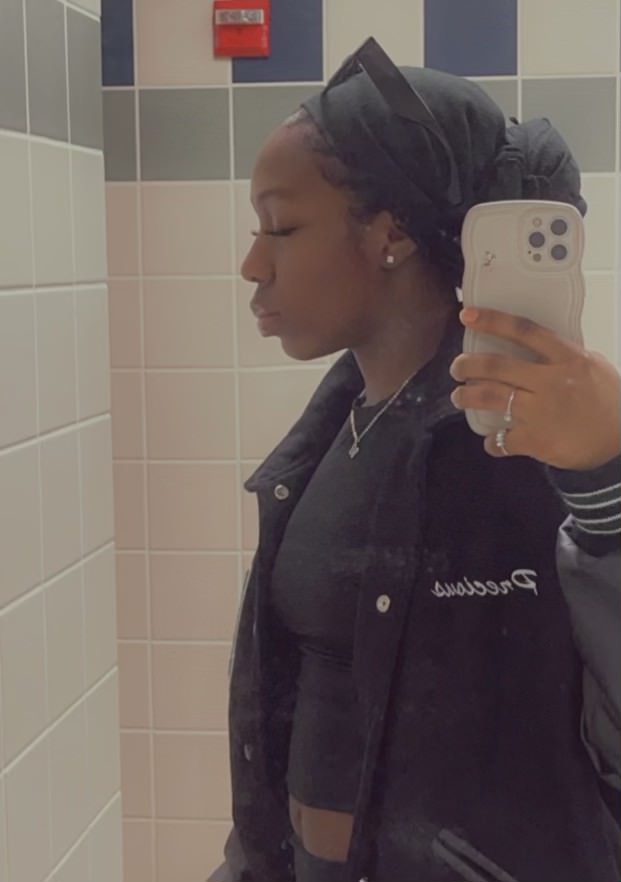The continent of Africa is a center of culture and history. Junior Precious Nwokolo is Nigerian and loves her culture. She is Igbo, one of the three ethnic groups from Nigeria along with the Hausa and Yoruba, and she has seen every part of culture from both Nigeria and America.
Holidays are extremely important to anyone due to their cultural significance and ability to form great memories with someone’s community. Nwokolo describes her Christmas celebrations in Nigeria with fondness.
“Every like four years to two years, we go to Nigeria during the Christmas period to celebrate and it’s so much fun. From the 25th of December to the 2nd of January there was this celebration we called a masquerade,” said Nwokolo. “Masqueraders come out and they run around and it’s so much fun to see them coming out because whenever a masquerader comes out, the females aren’t allowed to see them or go too close to them, so they normally chase the females. It’s so much fun running away from them and it’s so exciting.”
There are also many cultural differences between America and Nigeria, one of them being the way students interact with their teachers. Nwokolo finds that teachers in America have a lot less power over their students than in Nigeria.
“Back in Nigeria, teachers have authority. The teacher has permission to punish the kid, even if a child misbehaves at home. All the parent needs to do is just report that student to the teacher and they’re going to take care of it,” said Nwokolo. “When I come over here I see that this is just so different. Like students give attitude and try to be rude to teachers. I’m like, ‘Oh, this is so different than back in Nigeria.’”
This different way of teaching has affected the way people, especially young children, act. Nwokolo believes the kids in Nigeria are more respectful.
“I want to say the upbringing in Africa is so much better because you have the sense of maturity, the sense of respect, that you cannot find in most American kids,” said Nwokolo. “If you grew up in Africa you would know there is a difference.”
But, even though teachers in Nigeria have more power, they do not put in the same amount of effort that American teachers do. Nwokolo believes that teachers in America care far more about their students than Nigerian teachers.
“Teachers in Nigeria, they don’t get paid very well, so the teachers do the minimal so your parents have to go out of their way to pay for extra lessons for you to be perfect. But if you come here in America, even when students are being rude or the pay is not good, they really dedicate the time, the energy, to their students,” said Nwokolo. “Back in Nigeria, people don’t care about you. You have to do everything yourself, but here you have teachers who support you and everything. I feel like students here don’t even appreciate it.”
The sentiments around careers in Nigeria is also very different than it is in America. Nwokolo shares her experiences with the job market in Nigeria.
“In Africa, there are three major careers that you want to be. You want to be a doctor, or a lawyer, or an engineer. Any other thing apart from those is a no-go area because of the money you get. So when I came here, I see people wanting to be something they’re passionate about, which is good,” said Nwokolo. “Right now, I look at these based on the money because that is what you’re being trained for in Africa.”
This focus on money has affected the community in Nigeria, but the Nigerians in the community try to make the most of any situation.
“There’s always need for money. The common world, they give money to countries in Africa, but the presidents are very, very, very, very biased so they spend the money on themselves. They take their whole families to outside the country, give them the best education. They spend the whole money on themselves and don’t use the money for things we need and it makes the economy very, very bad,” said Nwokolo. “There’s a lot of expenses that require money in Africa or Nigeria, a lot of places require money, but in everything, we try to survive. That’s one thing about being in Nigeria. Even when everything is bad, even when things are not going the very best, when things are tight for everyone, we try to make a joke out of it. We know nothing lasts for long.”
The media in Western countries tends to focus on these negative aspects of Africa, even though there are many other beautiful parts of these countries that they ignore. News outlets also ignore similar problems in their own countries.
“The media portrays Africa as a bad place to be. They don’t show the good parts to make it seem like everyone in Africa is poverty-stricken, very dehydrated, malnourished, and I’m looking at America and I’m like, ‘You guys literally have beggars everywhere.’ Like, look anywhere in Dallas and you’ll definitely see a homeless person,” said Nwokolo. “It’s so frustrating when the media makes Africa look like this bad place, but any country in Africa is just like any other country. They have the good side and they have the bad parts.”
However, Nwokolo has noticed a shifting in the way the media portrays Africa. People are starting to see the other sides of Africa.
“I’m so happy right now that people are getting to know more about Africa, about Nigeria, because we are going out. We are spreading afro beats, spreadying every single thing we have created. Our population is becoming better, and the more we spread and the more we educate people we show them the good side about Africa,” said Nwokolo. “I love my culture so much because it’s so unique, and every time I hear someone talking about Igbo people it’s so great.”


